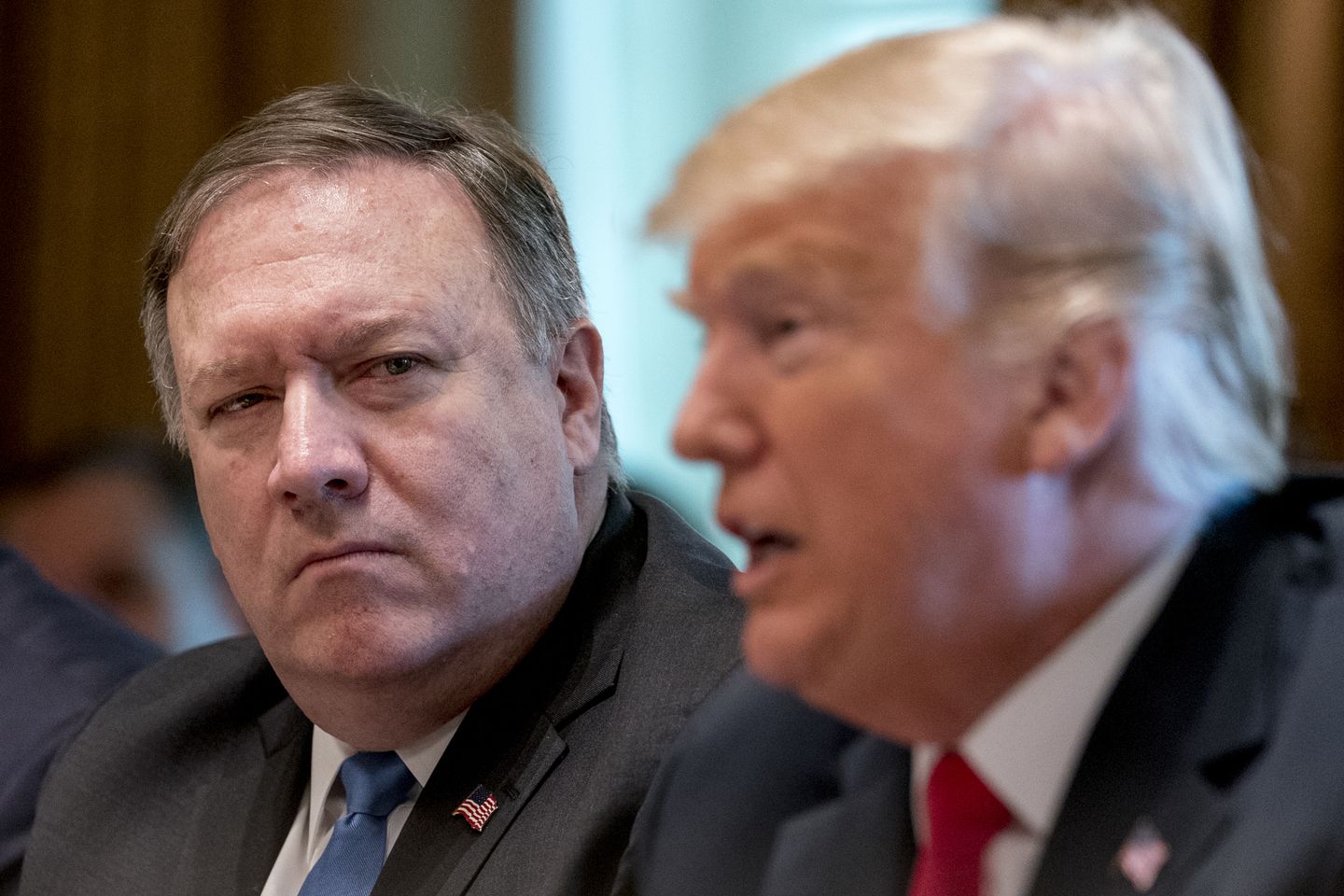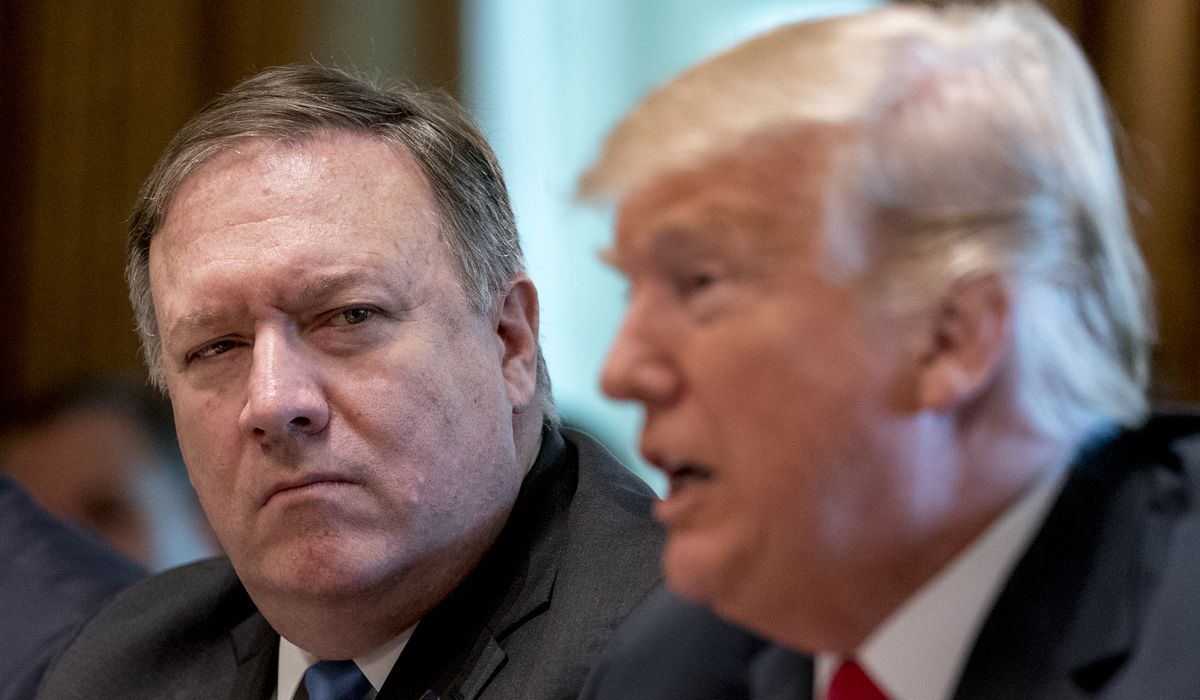

Iran signaled Monday that it still has objections to the West’s “final” proposal to restore the Obama-era nuclear deal, while officials in Tehran justified the weekend stabbing of author Salman Rushdie and Iranian state-controlled media warned that former President Trump and former Secretary of State Mike Pompeo could soon face similar violent attacks.
The stark threats from the Islamic republic came amid the Biden administration’s last-ditch push to revive a multilateral agreement limiting Iran’s nuclear program in exchange for economic sanctions relief.
The administration reiterated Monday that it won’t abandon negotiations with Iran, even after Tehran’s “disgusting” response to the attack on Mr. Rushdie and recent Justice Department charges that Iranian military operatives plotted to assassinate Mr. Pompeo and former White House National Security Adviser John Bolton on U.S. soil.
State Department spokesperson Ned Price tried to keep the issue of the ongoing nuclear talks separate from the growing list of Iranian provocations, said the U.S. and its negotiating partners remain laser-focused on the dangers posed by Iran’s nuclear-weapons program.
“President Biden…has provided clear instructions to the team. We will not allow Iran to acquire a nuclear weapon,” Mr. Price told reporters on Monday. “We continue to believe that diplomacy is by far the best, the most effective means by which to constrain, verifiably and permanently, Iran’s nuclear program.”
“The [Iran nuclear deal] is about the single, the central challenge we face with Iran, the core challenge, what would be the most threatening challenge we could possibly face from Iran — that is a nuclear weapon,” Mr. Price said.
Monday marked the deadline for Iran to issue its response to a European Union proposal reviving the 2015 nuclear deal, formally known as the Joint Comprehensive Plan of Action. Mr. Trump in 2019 pulled America out of that agreement, which was jointly signed by the U.S., Iran, Britain, France, Germany, Russia and China.
Iranian officials say the EU proposal represents substantial progress in negotiations but does not address several of Tehran’s key concerns.
Iranian Foreign Ministry spokesman Nasser Kanaani said Monday that the U.S. and Europe still haven’t agreed to all of Tehran’s “red lines” and demands.
“There has been some relative progress, but it could not secure Iran’s legal demands completely,” Mr. Kanaani said, according to the state-run Islamic Republic News Agency.
Among other things, Iran wants to limit an International Atomic Energy Agency investigation into alleged undeclared nuclear material inside the country. Iran also has indicated it wants the U.S. and Europe to lift economic sanctions on the Islamic Revolutionary Guard Corps (IRGC), the elite paramilitary group that the Justice Department has claimed was linked directly to a recent plot to murder Mr. Bolton.
Mr. Price on Monday suggested the administration isn’t willing to entertain such a move, nor will it lift the IRGC’s designation as a terrorist organization. He blasted recent “highly inaccurate reporting” that indicated the U.S. would consider such steps in order to secure an agreement.
Separately, Iranian media outlets reported Monday that the U.S. had agreed to two of Iran’s “demands” but did not provide any details.
Should the Biden administration ultimately strike a deal with Iran, the White House will face considerable blowback. Critics say the past week alone has provided more than enough evidence that doing business with the government in Tehran is naive and downright dangerous.
“Iran is actively plotting against multiple Americans. Waiting to impose consequences until after an attack is a dereliction of duty,” Rep. Michael McCaul, Texas Republican and ranking member on the House Foreign Affairs Committee, said in a statement late Sunday. “The administration’s priority needs to be protecting Americans, not negotiating a flawed nuclear deal.”
Mr. McCaul cited the recent attack on Mr. Rushdie, 75, as the direct result of the Iranian regime’s longtime “fatwa” calling for the author’s murder.
Mr. Rushdie was stabbed at least ten times Friday during a speaking engagement in New York. The Indian-born British writer has lived under threat since Iran’s Supreme Leader Ayatollah Khomeini issued a fatwa in response to his 1988 book “The Satanic Verses,” which some Muslims believe contains blasphemous depictions of the prophet Muhammad.
Mr. Rushdie’s alleged assailant, 24-year-old Hadi Matar, was quickly detained and charged with attempted murder.
Iran has denied any links to the attack.
However, Mr. Kanaani, the government spokesperson, suggested Monday that Mr. Rushdie brought the attack on himself.
“We believe that the insults made and the support he received was an insult against followers of all religions,” Mr. Kanaani said.
Mr. Price called Mr. Kanaani’s comments “despicable” and “disgusting,” echoing Secretary of State Antony Blinken’s words from a day earlier.
“Iranian state institutions have incited violence against Rushdie for generations, and state-affiliated media recently gloated about the attempt on his life,” Mr. Blinken said in a statement. “This is despicable.”
Iranian state media, meanwhile, predicted that the attack on Mr. Rushdie may have just been the beginning of a wave of violence.
Iran’s Kayhan newspaper, whose editor is personally chosen by Iran’s Supreme Leader Ayatollah Ali Khamenei, declared in a front-page editorial published on Sunday that “God has taken his revenge on Rushdie,” and that “it is now the turn of Trump and Pompeo.”
“The attack on [Mr. Rushdie] shows it is not a difficult job to take similar revenge on Trump and Pompeo and from now on they will feel more in danger for their lives,” the editorial read in part, according to English-language media translations.
The editorial was especially startling after the U.S. Justice Department last week brought charges against IRGC member Shahram Poursafi, alleging that the 45-year-old offered to pay contacts inside the U.S. up to $300,000 to kill Mr. Bolton.
U.S. officials say Iranian officials intended for the assassination to be payback for a January 2020 U.S. airstrike that killed top Iranian Gen. Qassem Soleimani.
Mr. Bolton was serving as national security adviser at the time of the Soleimani strike, which brought America and Iran to the brink of war. Sources familiar with the Justice Department’s charges against Mr. Poursafi have said Mr. Pompeo was also a target in the alleged Iranian plot.
• Joseph Clark contributed to this article, which is based in part on wire service reports.
